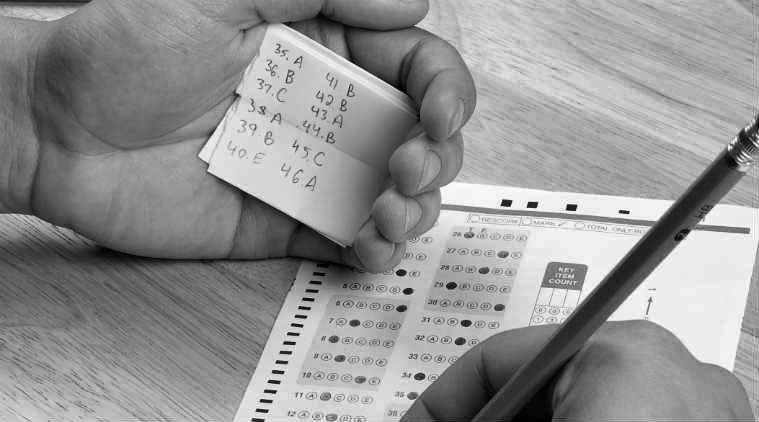
The Indian Express
Copying, cheating in exam like plague and pandemic, can ruin education system: HC
The student, in her plea, had said she appeared in all the exams, but in the 'International Trade' exam held on December 3, 2019, she got late due to traffic and inadvertently carried some notes in her stationery pouch.
by PTICopying and cheating in examinations are like a plague and Pandemic which ruin the society and the educational system of a country, the Delhi High Court Tuesday observed while upholding the Delhi University’s decision to cancel the entire Economics (Hons) fifth-semester examination of a student who was found carrying some notes.
Justice Pratibha M Singh dismissed the petition by a woman, a final year student of BA (Hons.) in Economics at Daulat Ram College, Delhi University, seeking declaration of her results for the fifth semester in four papers which were held in December 2019.
“The present case is definitely one which does not call for interference especially in exercise of extraordinary Constitutional remedies, in favour of the petitioner (woman), who has resorted to unethical practices and has not been truthful to this court. Accordingly, while confirming the punishment meted out to the petitioner, the present writ petition is dismissed,” the court said in its 20-page judgement.
At the outset, the high court said copying and cheating in examinations are like the plague and it is a pandemic which can ruin society and the educational system of any country and if it is left unchecked or if leniency is shown, the same can have a deleterious effect.
“For any country’s progress, the integrity of the educational system has to be infallible. Whether it is paper setters maintaining utmost confidentiality, students not cheating, invigilators being vigilant, examiners doing their job with utmost alacrity knowing that the future of students is in their hands, universities and colleges not tampering with results – the conduct of all stakeholders has to reflect commitment and also be unblemished,” the judge said.
The high court noted that in its April 22 order, it had taken note of the past performance of the woman in her board examination and also in the previous semesters and after believing her version that she had voluntarily surrendered the placards to the invigilator, it was sympathetic to her while calling for her result in the other three examinations in a sealed cover.
The high court said the plea of natural justice that the student was not heard in response to the show-cause notice has also turned out to be a specious plea.
She had written a reply to the show-cause notice and also apologised but she concealed the reply from the court, it noted.
“The documents produced by the University show that resorting to unfair means does not elude even meritorious students. This case is an example of why the merit or otherwise of a student in the past is completely irrelevant while considering malpractices such as these,” the high court said.
It added that the court could have proceeded with taking stricter action against the student, considering the false submissions made and wrong affidavit filed by her.
However, considering the woman’s age and the fact that she is still a student, the high court, while taking note of the unethical conduct of the petitioner, has decided not to take any further action against her.
The high court perused the result for the remaining three papers which has been submitted by the university and said no directions were called for in this regard and upheld the varsity’s decision to cancel the entire examination.
The student, in her plea, had said she appeared in all the exams, but in the ‘International Trade’ exam held on December 3, 2019, she got late due to traffic and inadvertently carried some notes in her stationery pouch.
She had claimed that when she realised it, she went to the invigilator to surrender the notes but she was not allowed to appear in the exam and by the time a fresh answer sheet was given to her, the time of the examination had concluded.
The invigilator’s allegation was that she was indulging in cheating in the examination.
A showcause notice was first issued to her and thereafter, on March 12, her entire examination was treated to be cancelled, she told the court, adding that she made representations to the university but no response was received.
The woman had alleged she was not afforded any hearing before the decision to cancel her examination was taken and barring her, the results of other students for the fifth semester have already been declared.